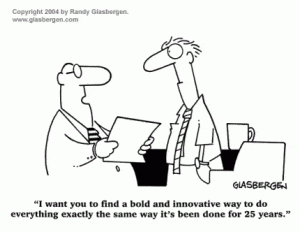written by Matt Andrews
Arnaldo Pellini recently wrote an interesting personal blog post about the Doing Development Differently workshop and manifesto. He concludes with, “I agree with these ideas and I can share and discuss these ideas with the team with whom I work but what difference can it make if the systems around us due to organizational culture, history, circumstances, and traditions struggle to embrace flexibility, uncertainty, untested experimentation, and slow incremental changes?”
This is an honest reflection from a practitioner in the field; and one that I hear often–from folks working in multilateral and bilateral agencies, as contractors, and beyond. It captures a concern that the development machinery (organizations, monitoring and reporting devices, profession-alliances, government counterparts, etc.) is structurally opposed to doing the kind of work one might call DDD or PDIA.
It’s like this cartoon…where our organizations say “let’s innovate but stay the same.”

I have been thinking about this a lot in the last few years, ever since I wrote chapter ten of my book…which asked whether the development community was capable of changing. In that chapter I was not especially confident but (I hope) I was still hopeful.
Since then, I think I’m more hopeful. Partly because,
- we have found many folks in the multilaterals, bilaterals, contractors etc. who are doing development in this more flexible way. We invited a range of them to the DDD Workshop and over 330 signed on to the DDD Manifesto. One of the goals of our work in the next while is to learn from these folks about HOW they do development differently even with the constraints they face. How do they get funders to embrace uncertainty? How do they get ministers in-country to buy-into flexibility and give up on straight isomorphism?
- I am also working on research projects that tackle this question; doing PDIA in real time, in places where development is predominantly done through the incumbent mechanisms. It is hard work, but I am finding various strategies to get buy-in to a new approach (including showing how problematic the old approach is, by working in the hardest areas where one has a counterfactual of failed past attempts, and more). I am also finding strategies to keep the process alive and buy more and more space for flexibility (by iterating tightly at first, for instance, and showing quick wins…and telling the story of learning and of increased engagement and empowerment). So far, I have not experienced complete success with what I have done, but I have certainly not struggled in getting support from the practitioners and authorisers we work with. (In my world it is harder to get support from academics, who think action research on implementation is a hobby and consultancy work… indeed, anything that does not say ‘RCT’ is considered less than academic. Sigh.)
All this is to say that I think Arnaldo is emphasizing a really important constraint on those working in development agencies. But a constraint that we should work through if we really do agree that these more problem driven, flexible approaches are what is needed. To Arnaldo and others I would suggest the following:
- Separate the conversation about which way we should do development from the conversation about how much our organizational realities ALLOW us to do it. The first conversation is: “Should we do DDD/PDIA?” The second conversation is: “How do we DDD/PDIA?” If we conflate the conversations we never move ahead. If we separate them then we can develop strategies to gradually introduce PDIA/DDD into what we do (in essence, I’m suggesting doing PDIA ourselves, to help change the way we do development…see an earlier blog).
- I also constantly remind myself that we (external folks in development organizations) are not the only ones facing a challenge of doing new stuff in existing contexts–with all the constraints of such. This is what we are asking of our counterparts and colleagues in the developing countries where we work. Dramatic and uncomfortable and impossible change is in the air every time we are introducing and facilitating and supporting and sponsoring work in developing countries. I always tell myself: “If we can’t work it out in our own organizations–when we think that our own organizational missions depend on such change–then we have no place asking folks in developing countries to work it out.”
- So, it’s a challenge. But a worthy one. And if we care about doing development with impact, I think it behooves us to face up to this challenge.
Good luck, Arnaldo, thanks for your honesty and for the obvious commitment that causes you to share your reality. It is really appreciated!